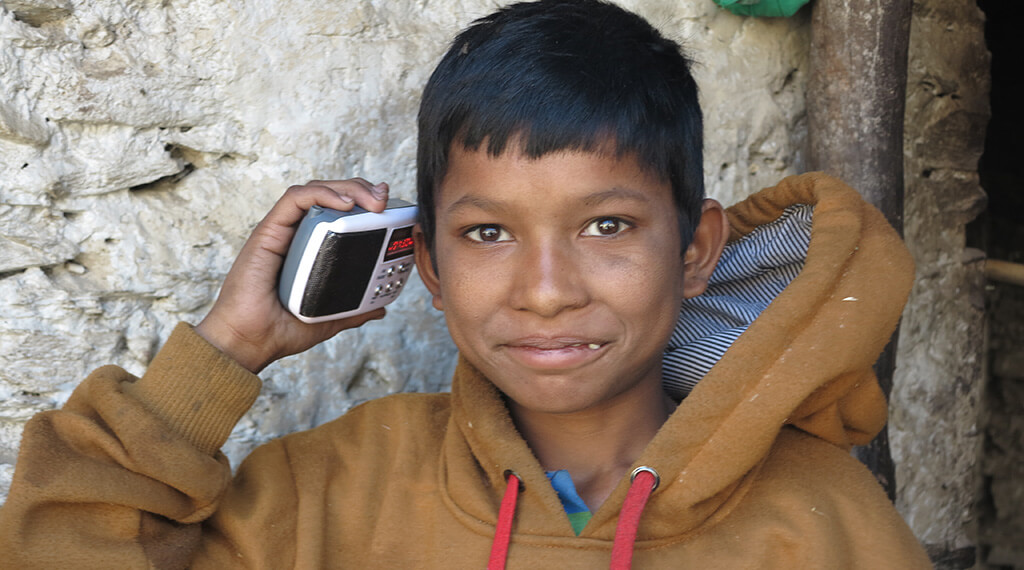We honor the life of George Verwer, our founder. Read More

Broadcasting the Gospel to a Fledgling and Scattered Church
When doors for sharing the gospel close, OMers look for open windows. During OM’s first few decades, special prayers of intercession were offered for nine countries where there were no known believers. Today, there isn’t a single one of these countries without at least some followers of Jesus. That’s encouraging!
Forty years later, one of the nine countries, Afghanistan, would become central to a divisive international conflict, scatter refugees abroad and remain without a viable church. Mel* is an OM worker who labored with these refugees in the Middle East in the 1980s. Later, while studying in Toronto, he met with a number of relocated Afghan refugees who had earlier come to faith, but none had continued with the Lord.
Refugees had come to faith, but not one had continued with the Lord
However, Mel and a few others located a young Christ-follower ready to serve his own people. This eventually led to the creation of Pamir Productions (now called Pamir Ministries), under the OM umbrella of ministries. Initially Pamir produced four 15-minute radio programs a week in the majority language of Dari. Within the year, programs expanded to half an hour, and there were seven a week.
Mel remembers the first letter they received from a listener. “We could hardly believe it. This person’s appreciation—and courage to write—was a huge boost for us. We started to answer letters and eventually created a program called Answers to Letters, reading listeners’ questions and answering them on air,” he said. This ground-breaking program continued through the end of the 1990s.
War changes everything; technology attracts listener feedback
In 2001 after 9/11, everything changed. More than five million refugees poured back into their homeland, but responses to the radio programs plummeted. Was it a good idea to continue with the programs, or look into new technologies that would attract more listener feedback?
Eventually, listeners were linked to a Western phone number, making it possible to engage the audience live, with a call-in format. Phone calls from Afghanistan motivated the team as they quickly built an effective means of follow-up.
“We respond to every call and follow (up) every lead. Today, more than 6,000 (nationals) are in our database. These represent Afghans who are at different points in their spiritual journey; many are sincerely interested in Christ but feel isolated. Some callers criticize the ministry and defend Islam. Others have come to faith and are eager to be discipled. Four to five … call every day to talk. Television programs, launched in 2010, are appreciated by a different segment of society,” notes Mel.
Pamir Ministries is passionate about using all media to spread the Gospel
Pamir has always been passionate about exploring all forms of media to spread the gospel. Working with other groups, the team was instrumental in producing a new translation of the Bible in the native language of their listeners (Dari). Despite the near impossibility of importing and distributing materials, a good number are available online and on apps at Pamir’s website, including the Scriptures. Everything is directly accessible to seekers and to Christians for sharing with friends and family. Using Internet and cell phones, team members call listeners each week for study of God’s Word. Dozens of classes have been taught this way, which they call “Telephone Bible Classes”.
Afghan culture is built on strong social networks and often includes a distrust of outsiders. In this context, these Bible classes are a way to potentially bring interested individuals into a network of seekers and believers without uprooting them from existing social groups. This can lead to churches forming. It’s more organic as well: individuals can stir interest among family members and friends for the study time, fulfilling Pamir’s vision of indigenous believers discipling others in their own people group.
Security concerns make in-country visits impractical, but Afghans continue to fan out across the world. In one year, 150,000 arrived in Germany, joining tens of thousands already settled there. This has spurred the church in Germany with Christians reaching out to these new neighbors. Pamir sees unprecedented opportunity in Europe for training and equipping this formerly unreached people so that they would reach their own social networks back home.
Plans for new media and discipleship
Looking ahead, Pamir aspires to grow in two areas. The first area is the production of more creative media involving a wider range of people in daily life, not just studio programs. Pamir is presently producing a family-life drama TV series. They have just recorded eight Afghan-life stories, where Afghan believers publicly share their journey of faith to Jesus.
Pamir is developing a pro-active social media team that hopes to launch a new phase of outreach soon. This will focus on two personas: one representing the religious devotee, committed to following Islam, and the second being the disillusioned Afghan who longs for a new way of life. Preparing for this launch requires much background work: creating landing pages for the websites, integrating potential contacts into the follow-up system, writing scripts, filming and editing short videos.
Coupled with cutting-edge social media, Pamir will engage a wider group of believers to challenge the status quo.
The second area for growth is in discipleship, such as with the Telephone Bible Classes, digital smartphone Bible courses and specialized training for seekers and young believers among Afghans in Europe. Pamir is partnering with other ministries that have existing and established discipleship programs.
Seventy years have passed since OM workers began praying for this very special country. Many twists and turns of history have touched Afghanistan in those years, and only God knows its future.
Pamir Ministries continues engaging with its people, day in and day out, with hope of a better future than ever before. One listener said it best: “I love how you talk about love and peace. We are tired of war and warlords. I give out your frequency. I want all our people to listen to these programs.”
* Name changed for security reasons
Keep up with and pray for OM’s Ministries
Your privacy is always important to us. When you visit our site, we may use cookies to improve your experience by storing information on your browser. These cookies help us understand things like browsing behavior so we can personalize your visit. You can manage your cookie preferences anytime by adjusting your settings. Just keep in mind that blocking some cookies may affect certain website features and functions.



